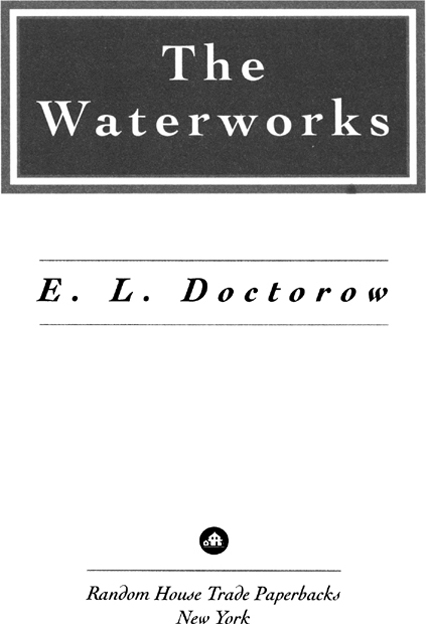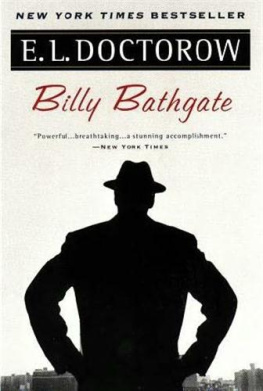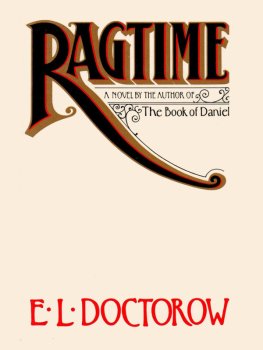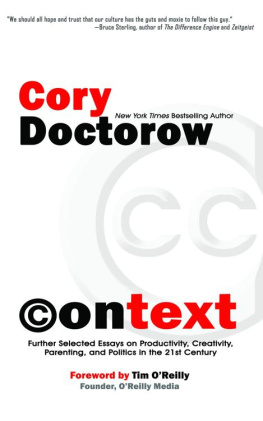E. L. Doctorow - The Waterworks
Here you can read online E. L. Doctorow - The Waterworks full text of the book (entire story) in english for free. Download pdf and epub, get meaning, cover and reviews about this ebook. year: 2007, publisher: Random House Trade Paperbacks, genre: Detective and thriller. Description of the work, (preface) as well as reviews are available. Best literature library LitArk.com created for fans of good reading and offers a wide selection of genres:
Romance novel
Science fiction
Adventure
Detective
Science
History
Home and family
Prose
Art
Politics
Computer
Non-fiction
Religion
Business
Children
Humor
Choose a favorite category and find really read worthwhile books. Enjoy immersion in the world of imagination, feel the emotions of the characters or learn something new for yourself, make an fascinating discovery.

- Book:The Waterworks
- Author:
- Publisher:Random House Trade Paperbacks
- Genre:
- Year:2007
- Rating:4 / 5
- Favourites:Add to favourites
- Your mark:
- 80
- 1
- 2
- 3
- 4
- 5
The Waterworks: summary, description and annotation
We offer to read an annotation, description, summary or preface (depends on what the author of the book "The Waterworks" wrote himself). If you haven't found the necessary information about the book — write in the comments, we will try to find it.
The Waterworks — read online for free the complete book (whole text) full work
Below is the text of the book, divided by pages. System saving the place of the last page read, allows you to conveniently read the book "The Waterworks" online for free, without having to search again every time where you left off. Put a bookmark, and you can go to the page where you finished reading at any time.
Font size:
Interval:
Bookmark:

Praise for
The Waterworks
A pulsating city an electric time a mastermind of fiction an immense, extraordinary achievement.
San Francisco Chronicle
Fascinatingly ominous a dark moral tale an eloquently troubling evocation of our past.
The New York Times
Terrific Doctorow knows the art of storytelling inside out. He weaves a spell of genuine creepiness.
Newsweek
What Charles Dickens was to London, E. L. Doctorow is becoming to New York. Like Dickens he shows enormous compassion for his subject, at the same time driving a stake through the heart of its corruption.
The Atlanta Journal-Constitution
An utterly engaging tale Doctorow has never so effectively combined history with invention.
The San Diego Union-Tribune
Profoundly haunting a journey of the imagination into uncharted territory It is as if Edgar Allan Poe and Henry James had combined their geniuses.
Publishers Weekly
A flawless thriller A secret laboratory, a criminal genius, and two missing persons add up to a chillingly prescient tale. So much fun to read.
Entertainment Weekly
An elegant page-turner of nineteenth-century detective fiction seductive.
The Washington Post Book World
A ripping good yarn a splendid addition to an already remarkable body of work.
Detroit Free Press
A detective story in the best pistols-and-gaslight style Doctorow at his best.
New York Daily News
An awfully good novel a suspenseful inquiry into the relationship in America between power, evil, and the growth of the city.
Esquire
Doctorow is a remarkable writer. He casts his imagination into a patch of American history and makes it his own. The Waterworks is a powerful assertion of artistic strategy and tact.
The Nation
Also by E. L. Doctorow
Welcome to Hard Times
Big as Life
The Book of Daniel
Ragtime
Drinks Before Dinner (play)
Loon Lake
Lives of the Poets
Worlds Fair
Billy Bathgate
Jack London, Hemingway, and the Constitution (essays)
City of God
Sweet Land Stories
The March
Creationists: Selected Essays, 19932006

For
I. Doctorow
and
Philip Blair Rice

P EOPLE wouldnt take what Martin Pemberton said as literal truth, he was much too melodramatic or too tormented to speak plainly. Women were attracted to him for thisthey imagined him as something of a poet, though he was if anything a critic, a critic of his life and times. So when he went around muttering that his father was still alive, those of us who heard him, and remembered his father, felt he was speaking of the persistence of evil in general.
In those days the Telegram relied heavily on freelances. I always had my eye out for a good freelance and I kept a clutch of them on call. Martin Pemberton was the best of the lot, though I would never tell him that. I treated him as I treated them all. I was derisive because it was expected of me, I was funny so that I could be quoted in the saloons, and I was reasonably fair because that is the way I am but I was also interested in the language and wanted all of them to write it for my approval which, if it came at all, came barbed.
Of course, none of this was particularly effective with Martin Pemberton. He was a moody, distracted young fellow, and it was clear his own mind was more company to him than people were. He had light gray eyes which spasmodically widened from the slightest stimulus. His eyebrows would arch and then contract to a frown, and he would seem for a moment to be looking not at the world but into it. He suffered an intensity of awarenessseeming to live at some level so beyond you that you felt your own self fading in his presence, you felt your hollowness or fraudulence as a person. Most freelances are nervous craven creatures, it is such a tenuous living after all, but this one was prideful, he knew how well he wrote, and never deferred to my opinion. That alone would have set him apart.
He was slight, with a well-boned, clean-shaven face and pale thinning hair. He strode about the city with a stiff-legged gait, like a man much taller. He would walk down Broadway with his Union greatcoat open, flowing behind him like a cape. Martin was of that postwar generation for whom the materials of the war were ironic objects of art or fashion. He and his friends made little social enclaves of irony. He once told me the war had not been between the Union and the Rebs but between two confederate states, and so a confederacy had to win. I am a man who will never be able to think of anyone but Abe Lincoln as president, so you can imagine how a remark like that stood with me. But I was intrigued by the worldview behind it. I was not myself exactly complacent about our modern industrial civilization.
Martins best friend was an artist, a big, fleshy fellow named Harry Wheelwright. When not importuning dowagers for portrait commissions, Wheelwright drew mutilated veterans he picked up off the street with pointed attention to their disfigurement. I thought his drawings were the equivalent of Martins tactless but informed reviews and cultural critiques. As for me, my newsmans cilia were up and waving. The soul of the city was always my subject, and it was a roiling soul, twisting and turning over on itself, forming and re-forming, gathering into itself and opening out again like blown cloud. These young men were a wary generation, without illusions revolutionaries of a sort though perhaps too vulnerable ever to accomplish anything. Martins defiant subjection to his own life and times was manifest but you didnt know how long he could go on with it.
I did not usually care to know anything about the background of a freelance. But in this case I couldnt help knowing. Martin had come from wealth. His father was the late, notorious Augustus Pemberton, who had done enough to shame and mortify their line for generations to come, having made a fortune in the war supplying the Army of the North with boots that fell apart, blankets that dissolved in rain, tents that tore at the grommets, and uniform cloth that bled dye. Our name for this was shoddy, used as a noun. But shoddy wasnt the worst of old Pembertons sins. He had made an even bigger fortune running slavers. You would think the slave trade was exclusive to the southern ports, but Augustus ran it from New Yorkeven after the war had begun, as late as sixty-two. He had some Portuguese as partners, the Portuguese being specialists in the trade. They sailed ships to Africa right here from Fulton Street, and sailed them back across the ocean to Cuba, where the cargo was sold to the sugar plantations. The ships were scuttled because the stench could not be got rid of. But the profits were so enormous they could buy another ship. And another after that.
So that was Martins father. You can understand why a son would choose, like a penance, the deprived life of a freelance. Martin had known everything the old man had done and at a still young age had arranged to be disinheritedhow I will explain presently. Here I will point out that to run slavers out of New York, Augustus Pemberton had to have the port wardens in his pocket. A slavers belowdecks were carpentered to pack in as many human beings as possible, there was no headroomnobody could board a slaver and not know what she was. So it was hardly a surprise that when Augustus Pemberton died after a long illness, in 1870, and was buried from St. James Episcopal, on Laight Street, the citys leading dignitaries showed up at the funeral, led by Boss Tweed himself, along with members of the Ringthe comptroller, the mayorseveral judges, dozens of Wall Street thieves and that he was honored with major obituaries in every daily paper, including the
Font size:
Interval:
Bookmark:
Similar books «The Waterworks»
Look at similar books to The Waterworks. We have selected literature similar in name and meaning in the hope of providing readers with more options to find new, interesting, not yet read works.
Discussion, reviews of the book The Waterworks and just readers' own opinions. Leave your comments, write what you think about the work, its meaning or the main characters. Specify what exactly you liked and what you didn't like, and why you think so.







